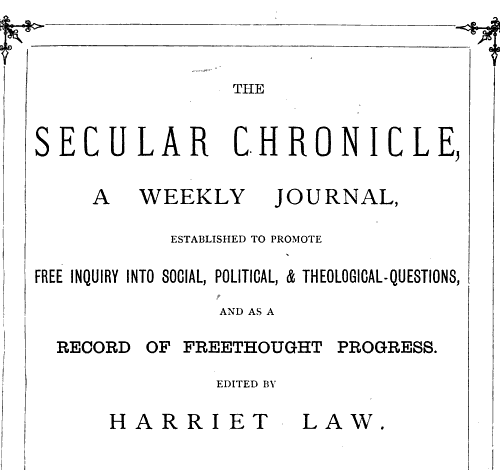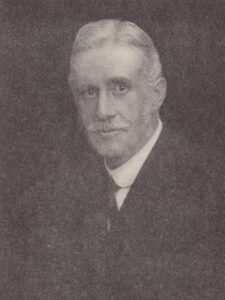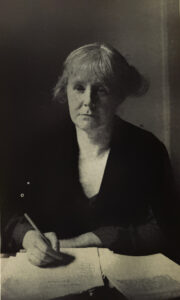

This article appeared in The Secular Chronicle (Vol. V, No. 1), 2 January 1876. It marked the first issue edited by Harriet Law, who penned ‘A Few Words to Freethinkers’, laying out her ideals and aims for the paper.
Owing to the decease of our lamented friend Mr. G.H. Reddalls, it was considered necessary to dispose of the plant and copyright of the Secular Chronicle. We (having been kindly promised a large amount of assistance and support from the Freethought party) have undertaken the labour and responsibility of conducting that journal and therefore beg to lay before its readers a simple but definite outline of its principles, aims, and objects:-
Liberty, equality, and fraternity will be its motto; measures, rather than men, its objects; principle, rather than policy, its guide.
A page will be appropriated to the advocacy of those political, social, and domestic matters that especially affect women, knowing, as we do, that the world’s progress will be accelerated a thousand fold by their emancipation. We feel that no apology is needed for employing space in the service of the finest and fairest of nature’s modes.
Its politics will be Republican. Believing, as we do, every form of monarchy to be injurious and degrading to both sovereigns and subjects, the chief cause of war, waste, and want, of ignorance, superstition, and crime.
Were half the power that fills the world with terror,
Were half the wealth bestowed on camps and courts,
Given to redeem the human mind from error,
There were no need of arsenals and forts.
Our unions will be filled with paupers, our prisons with felons, our streets with beggars, our pulpits with hypocrites, so long as we lavish the products of field and factory upon kings and aristocrats, instead of using them to raise the morals, cultivate the minds, develop the bodies of all nature’s children in proportions as equal as possible.
Professor Lecky says:- “When we remember for how long a period the Church of England maintained that resistance to the regal power was in all cases a deadly sin, and that such men as Washington and Garibaldi were ‘doomed to burn together in hell with Satan, the first founder of rebellion,’ it is hard to say whether the condition of English public opinion shows most clearly the impotence of the theologians, who were unable to prevent so absolute a rejection of their principles, or the elasticity of the church that has survived it.”
As opportunity offers there will be delineated in the pages of the Secular Chronicle the brilliant of a Voltaire, the sterling common sense of a Paine, the uncompromising courage of a Carlisle, the patient endurance of a Hetherington, the scathing sarcasm of a Southwell, the loving kindness of an Owen, the profound logic of a Mill, with the glorious poesy of a Pope, a Byron, and a Shelley.
The highest and broadest kind of co-operation, as embodied in the communistic system of Owen, will be maintained, as calculated to the mutual benefit of all – to destroy those monstrous combinations of caste and capital which enslave the many to the few, and mar the true peace and purity of the whole human family. Co-operation in its most elementary form is so thoroughly beneficial that every class resorts to it when results of competition become unbearable; while communism (which is national co-operation) combines the strength of unionism, the zeal of patriotism, and resources of individualism; and would, if adopted, introduce that social millennium, sung of by poets, and longed for by every lover of mankind.
Utility, or “the greatest happiness principle,” will be recognised as the foundation of morality; holding “actions to be right as they tend to promote happiness, and wrong as they tend to produce the reverse of happiness,” a basis greatly misrepresented by liberal religious authors. One of clearest thinkers and finest writers of modern days has penned the following:- “Utility is perhaps the highest motive to which reason can attain. The sacrifice of enjoyments and the endurance of suffering, become rational only when some compensating advantage can be expected. The conduct of the Turkish Atheist, who, believing that death an eternal sleep, refused at the stake to utter the recantation which would save his life, replying to every remonstrance, ‘although there is no recompense to be looked for, yet the love of truth straineth me to die in its defence,’ in the eye of reason is an inexplicable folly; and it is only by appealing to a far higher faculty that it appears in its true light, as one of the loftiest forms of virtue.”
He fails to perceive that it would be more painful to the Atheist to betray the truth than to die for it.
Although an Atheist and Republican and woman’s rights advocate, we hope to have important topics examined and discussed in our paper in a fair and impartial spirit, as its columns be accessible to all – Christians and Secularists alike – who treat their subjects with competence and their opponents with courtesy.
Wishing our friends and fellow labourers a Happy New Year, rejoicing that 1876 dawns upon them with the inherited light and strength of untold ages, while 75 retires laden with intellectual triumphs and moral victories; to become a page in history, a beacon to unborn generations. But as working is better than wishing, we despatch our little messenger, trusting it will perform its humble part towards making the new year even better the old.
Read the original: The Secular Chronicle, 2 January 1876

We have the faculties for gaining knowledge; and Rationalism will always maintain that we are at liberty to use them […]

Good writing excites me, and makes life worth living. Harold Pinter Harold Pinter was one of the 20th century’s most […]

What is this ban on abortion? It is a sexual taboo, it is the terror that women should experiment and […]

What is needed is something in which [we] can all believe irrespective of religion, which in most cases, dare I […]